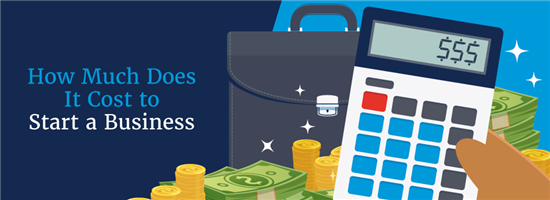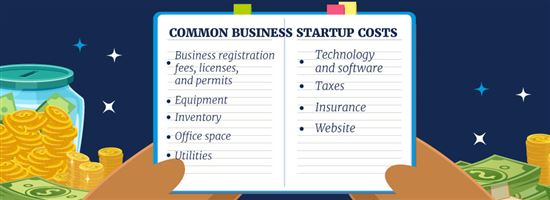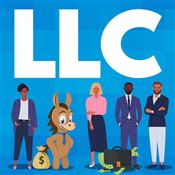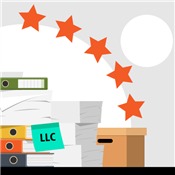How Much Does It Cost to Start a Business
Startup costs are always a key consideration when starting a new business. Figure out how much yours will cost with this detailed guide.
 |
Understanding your startup costs can be overwhelming. The figures vary from industry to industry and business to business.
And if you can't track your finances accurately, your business could be in trouble. Or worse, it could fail.
Fortunately, with the right sources, you can estimate your startup costs. Building a habit of keeping a detailed budget will also give your business a better chance at success.
Keep reading to learn more about the different startup costs and how to reduce them.
How much money do you need to start a business?
On average, you need around $30k to $40k to start a business. But some business ideas only require $10k or less.
Multiple factors determine how much capital you need to start a business. For example, your platform matters. Online companies generally have fewer startup costs than brick-and-mortar ones.
Estimate your business costs by adding your initial expenses to CreditDonkey's Business Startup Calculator below.
Your niche or industry also plays a part. For example, if you're building a tech app, you could have much lower costs than if you are starting your own restaurant.
Whether you hire employees or not can also impact your startup costs. And the more people you hire, the more you'll need.
So, how do you determine how much you need to get started? Let's discuss it in the next section.
Yes, you can start a business with no money. Some examples of business ideas with almost no startup costs include pet sitting, blogging/freelance writing, and dropshipping.
How to determine your startup costs
 |
Figuring out how much you need to start your own business can be tricky, especially since you must consider multiple factors.
Here are some tips to help you figure out your startup costs:
Research your industry expenses
As mentioned, different industries have different startup costs. You may need special equipment or permits in some cases before you can start a business in that field.
So it's best to research the one you're entering to understand what business startup costs you must prepare for.
Generally, it's best to have enough to cover at least 1 month's business expenses. But many advise planning for at least 6 to 12 months instead.
Understand the different types of costs
It's also a good idea to familiarize yourself with the different types of business costs. Doing so can help you prioritize and budget more effectively.
Business costs generally fall under these categories:
- One-time vs. ongoing
One-time costs are business expenses you only need to pay once. Some examples are:- Business registration fees
- Renovations to your physical shop
- Equipment costs
- Etc
Ongoing costs are expenses you need to consider and budget for regularly. These usually mean:
- Utility bills
- Monthly rent
- Employee salaries
- Taxes
- etc
- Business registration fees
- Essential vs. optional
Essential costs are non-negotiable business expenses. That means you must always set aside enough room in your budget for these expenses. These include:- Equipment
- Insurance
- Inventory costs
Optional costs are ones your business can benefit from, but you don't really need. For example, marketing campaigns can help your business expand its reach. But your business won't fail without one.
- Equipment
- Fixed vs. variable
Fixed costs are business expenses you can expect to stay the same for a certain period. For example, software subscription fees, rent, and basic supplies usually cost the same monthly.Variable costs are trickier to plan for since different factors can impact its price. Some examples include:
- Raw material costs
- Delivery rates
- Credit card fees
- Etc
- Raw material costs
Break down and estimate your costs
Once you understand the different categories, your next step is to list your business needs and their average costs.
You can start with the most common ones or those you've already incurred, like equipment and business registration fees. Doing this can give you a clearer picture of your startup costs and budget accordingly for each one.
Then, compare your list with your budget and estimate how much you must set aside for each expense based on their average cost and priority.
Now that you know how to determine your startup costs, let's discuss what the most common startup costs are. Read on.
Most common business startup costs
 |
Startup costs differ in every industry. But here are a few common ones you should prepare for:
- Business registration fees, licenses, and permits
You typically need to choose a business structure when starting a business.Most businesses begin as sole proprietorships. But registering yours as an LLC can offer many benefits, including limited liability protection and increased credibility.
If you choose to form an LLC, you need to consider the filing fee as part of your startup costs. LLC filing fees vary from state to state, usually from $50 to $150, although it can be as high as $500 in some states.
Want to reduce your startup costs? LLC filing fees are a tax-deductible business expense. This is one way to reduce costs to formalize your business structure.But even if you stay as a sole proprietor or partnership, you still need to consider business permits and licenses in your budget.
Like LLC filing fees, the amount you need to pay will differ in every area. And you might need permits/licenses on local, state, and federal levels, depending on your specific industry.
- Equipment
Equipment costs are another major consideration when starting your own business. And it can take up most of your budget, especially if you need specialized equipment.Depending on your industry and the scale of your operations, equipment can cost anywhere from $10k to $100k+.
Leasing equipment can be a more cost-effective alternative if you have a limited budget. But you also need to consider other factors like down payments, interest rates, and insurance costs.
The average interest rates for leasing business equipment are from 5% to 15%. Factors like your credit score can impact the exact rate you receive. - Inventory
You also need to consider the costs of your initial inventory, especially if you're in the retail industry. Having some of your items on hand is best to quickly fulfill customers' orders.In general, it's a good idea to allocate 17% to 25% of your total budget for inventory. Just make sure you don't over- or understock your items.
Overstocking can mean getting stuck with items you can't sell. And understocking can mean losing potential customers if you can't fulfill their orders immediately.
- Office space
Like equipment, office expenses could take up a large chunk of your budget. Or if your team is online, it could cost nothing almost nothing.Location is a key factor in the price. Busier areas are generally more expensive than somewhere with less foot traffic. Its size matters, too, especially if you hire employees.
That said, the average cost for commercial spaces is around $38 per square foot.[1] But this can be more expensive in some cities, like New York or San Francisco.
If you're renting, you can still expect to pay around $300 to $1,000+ per month on average.
If you need the space long-term, consider signing an annual lease to reduce the overall amount you must pay. - Utilities
You'll need to consider utility costs if you have a physical space for your business. This usually means gas, electricity, water, and phone/internet bills.Like the space itself, location and size matter. The average utility costs for commercial spaces in the U.S. are around $2.10/square foot[2]. Some areas may charge higher rates, especially if you have a larger office.
- Technology and software
Investing in business software solutions, like payroll and bookkeeping services, can also help you manage your business.They automate and simplify many administrative processes, so you can focus on other aspects of your company.
For example, payroll services can ensure you're paying your employees correctly and on time. On the other hand, bookkeeping software can help keep your financial records well-organized.
You might also need to consider Point of Sale (PoS) software if you're in the retail industry.
That said, the price for each one varies. And it's usually determined by factors like features and the number of employees.
Most services charge a monthly base fee and a per-employee fee. Of course, there are free options available. But these usually have more limited features compared to paid subscriptions.
Overall, it's best to allocate around 3% to 6% of your regular budget for these tech programs.
- Insurance
Insurance is another startup cost you have to consider, regardless of your business structure or industry.There are different types of business insurance policies you can get. The most common types for small businesses are general liability insurance, workers' compensation, and commercial property insurance.
An insurance policy can protect you and your business if something goes wrong (e.g., fires, natural disasters, lawsuits, etc.). But they can be costly, especially if you need comprehensive coverage or have a lot of employees.
That said, the average cost for small business insurance policies is around $500 to $800 per year.[3]
You can sometimes get discounted rates if you combine general liability with commercial property insurance in one comprehensive package called a Business Owner's Policy (BOP). - Taxes
Paying taxes is a requirement for all businesses, especially those wanting to retain their good standing with the government.If you're a sole proprietor or partnership, you don't have to pay corporate income tax since the IRS considers these pass-through entities.[4] That means you only have to pay taxes on your personal income tax returns.
The tax rule about pass-through entities also applies to LLCs since these are taxed as sole proprietors/partnerships by default.But if you choose a C- or S-Corporation tax classification, you have to pay income taxes on individual and corporate levels. Corporate tax rates usually differ in every state. But the federal rate is currently fixed at 21%.[5]
Besides income tax, your business might also need to pay the following taxes:
- Payroll and employer taxes
- Self-employment tax
- Property tax
- Sales tax
- Excise tax
You can check the official IRS website to learn more about the different types of business taxes.
- Payroll and employer taxes
- Website
A company website can be a good idea, even if your business isn't online. It will make it appear more professional and make it easier for customers to learn more about your products/services.You can create a website for free. But like free business software, this option is usually more limited. And it might not work long-term, especially if your business expands.
In general, you can expect to pay around $1,500 to $15,000 to build a small business website.
How to fund your startup
Determining how you'll pay for your business startup costs is just as important as knowing how much they are.
There are several ways you can fund your startup. Here are some of the most common ones:
- Self-funding
This is the most common way entrepreneurs fund their new businesses (it's also called "bootstrapping"). This option usually involves using your personal savings or retirement funds to cover your startup costs.Ideally, you should have at least 3 to 6 months' worth of savings to cover both your business startup costs and living expenses.- No eligibility requirements
- No strict payment deadlines or interest rates
- Full control over your business
- Risk losing personal savings for good
- Friends and family
Borrowing from your loved ones is a popular alternative if your personal savings aren't enough to cover your business startup costs.Like with self-funding, you don't really have to worry about interest rates, payment deadlines, or penalty fees. You also don't need to worry about strict requirements to be eligible.
- No strict requirements
- No interest rates or penalties for payments
- More freedom over where and how to use the money
- Can negatively impact your personal relationships
- Small business loans
If you don't want to mix personal and business matters, you can get a small business loan instead.Keep in mind that there are different types you can choose from. So make sure you do your research first before applying for one.
- Additional funding for business expenses
- Builds business credit history
- Designed for small business owners
- Possible high interest rates
- Strict eligibility requirements
- Government grants
Some call grants "free money" because you don't have to pay it back, unlike loans. But to get one, your business needs to meet specific criteria and submit a detailed grant proposal.Want to apply for one? Check out the government's official grant website.The government awards grants to businesses or organizations whose activities they consider "beneficial." This usually means their company serves the community. Or furthers the government's advocacies/goals.
- No need to repay it
- No interest rates
- Retain full ownership of your business
- Fierce competition
- Must meet specific requirements
- Angel investors
Angel investors are high-net-worth individuals who give startups with high growth potential funding to get their business off the ground.They're also usually industry experts and invest mainly in companies within their field of expertise.
- No need for immediate repayment
- Can connect you with other experts
- Provides detailed insights and expert guidance
- Requires equity ownership in exchange
- Venture capitalists
Venture capitalists are a type of private equity investor who finance startups or new small businesses.Like angel investors, they mainly go for companies with high growth potential and are experts in their fields. VC funding can come from solo entrepreneurs or firms.
- Expert guidance
- Broad professional network
- Need to repay them only when the business grows
- Equity ownership needed
- Crowdfunding
Crowdfunding involves asking other people (usually strangers) to donate what they can to help finance your business idea.It's a great option if you want no-strings-attached funding for your startup or small business. Some popular crowdfunding platforms are Kickstarter, GoFundMe, and Patreon.
- No strings attached
- Validates your business idea's viability
- Connect with potential customers
- Might not meet the target amount
- Can take a long time to pool the required amount
Even when you already have the funds for your startup, you need to make sure that you spend it well.
Next, let's talk about how to lower your startup costs and make the most out of your funding.
How to save on your startup costs
Starting your own business can be expensive. But you can save significant money with a keen eye on your finances.
Here are some tips you can try:
- Consider automation or outsourcing.
If you need help with managing your business but don't have the budget to hire employees, automation and/or outsourcing are great budget-friendly alternatives.With outsourcing, you don't have to worry about things like payroll taxes, employee benefits, training, etc. You usually just have to pay for the work done.
For less complex tasks, you can turn to business software to automate and simplify them instead.
Programs like QuickBooks Online and ADP Payroll are more than enough to handle most small business accounting and payroll needs. So you no longer need to hire a dedicated accountant to handle them.
- Shift to remote work.
If you don't really need a physical space for your business, consider shifting to remote work instead.Not only will this lower your overhead costs, like rent, utility costs, and maintenance fees. But it can also increase your team's overall productivity.
Did you know?
Approximately 94% of employees said they feel like they're still/ more productive after changing to a work-from-home setup. And around 75% believe that working remotely gives them a better work-life balance[6]. - Buy in bulk.
Whether it's office supplies or manufacturing materials, you usually can save more if you buy things you regularly need in large quantities.Suppliers also sometimes offer additional discounts for bulk purchases from repeat buyers. So ask yours if they have one to get a better deal.
Speaking of discounts, here's another way you can save on costs when getting goods or services that you need.
- Barter with other small business owners.
Bartering/exchanging services with other small business owners can help you get what you need without going over budget. Just make sure it's actually a fair trade.Working with other businesses in your industry is also a great way to expand your professional network. It can even help you spread the word about your new company and attract potential customers.
- Market on social media.
You can also save on marketing costs if you use social media platforms to get the word out. Because they usually let you create an account or page for free.Most people are also on social media these days. So it's a great way to connect with your customers and increase your brand's visibility without adding to your costs.
Did you know?
There are more than 4 billion people on social media as of 2021[7]. - Make the most of tax deductions.
You can also reduce the impact of business expenses on your finances by maximizing every tax deduction you can.Some examples of tax-deductible business expenses for small businesses are:
- Inventory costs
- Business insurance costs
- office supplies and furniture
Just remember that not all business expenses are tax-deductible. So make sure you do your research or consult with an expert before you write it off as one during tax season.
You can also read more about tax-deductible business expenses on the IRS' official website.
- Inventory costs
What the Experts Say
CreditDonkey asked a panel of industry experts to answer readers' most pressing questions. Here's what they said:
Bottom Line
Starting your own business can be daunting, especially considering how much it costs.
But understanding the different startup costs is still important because it can help you create and stick to a clear budget.
And this, in turn, can help you avoid the common financial pitfalls new businesses experience. It will also give your business healthy finances you can build on for years.
References
- ^ CommercialEdge. National Office Report, Retrieved 4/1/2023
- ^ Iota Communications. Average Utility Cost Per Square Foot for Commercial Properties, Retrieved 11/03/2023
- ^ Insureon. Small Business Insurance Costs, Retrieved 03/11/2024
- ^ Internal Revenue Service. Single Member Limited Liability Companies, Retrieved 4/1/2023
- ^ U.S. Government Accountability Office. Corporate Income Tax, Retrieved 4/1/2023
- ^ Zippia. Remote Work Statistics, Retrieved 11/01/2023
- ^ Backlinko. Social Media Users, Retrieved 11/02/2023
Write to Alyssa Supetran at feedback@creditdonkey.com. Follow us on Twitter and Facebook for our latest posts.
Note: This website is made possible through financial relationships with some of the products and services mentioned on this site. We may receive compensation if you shop through links in our content. You do not have to use our links, but you help support CreditDonkey if you do.
|
|
|











